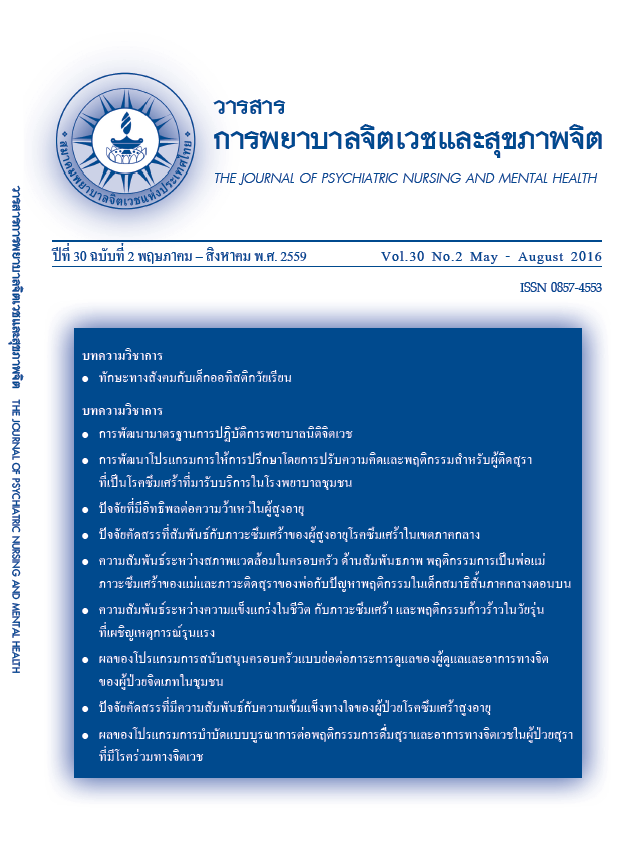ความสัมพันธ์ระหว่างสภาพแวดล้อมในครอบครัวด้านสัมพันธภาพ พฤติกรรมการเป็นพ่อแม่ ภาวะซึมเศร้าของแม่และภาวะติดสุราของพ่อ กับปัญหาพฤติกรรมในเด็กสมาธิสั้นภาคกลางตอนบน RELATIONSHIPS BETWEEN FAMILY ENVIRONMENT-RELATIONSHIP DIMENSION, PARENTING BEHAVIORS, MATERNAL
Main Article Content
บทคัดย่อ
Abstract
Objectives:To study: 1) behavioral problems of children with ADHD, 2) family environment-relationship dimension, parenting behaviors, maternal depression and paternal alcohol dependence, and 3) relationships between family environment-relationship dimension, parenting behaviors, maternal depression and paternal alcohol dependent and behavioral problems in children with ADHD.
Methods: Subjects were 154 parents of children with ADHD (aged 6-12 years) who continually visited the out -patient department of government hospitals, upper central region of Thailand. Research instruments consisted of 1) Family environment scale – relationship subscale 2) parents behavior scale (Parents vision) 3) The Strengths and Difficulties Questionnaire (SDQ). 4) Hamilton Rating Scale for depression. and 5) Alcohol use disorder identification test (AUDIT). Content validity of all instruments were established by a panel of 7 experts. The instruments’ reliabilities were .86, .81, .81, .85, and .90. Data were analyzed by descriptive statistics and Pearson’s Product–Moment Correlation.
Results:
1) Sixty- nine point five percent of children with ADHD had behavioral problems. Conduct problems was found the most, followed by peer relationship problems, hyperactivity problems, social relationship problems, and emotional problems (80.5%, 75.3%, 56.5%, 24.7% and 15.6%, respectively).
2) Family environment-relationship dimension of the children with ADHD was at the good level (79.2%), parenting behaviors was at moderate level (86.4%), maternal depression and paternal alcohol dependence were 18.8 % and 8.4% of the studied families.
3) Family environment relationship dimension and parenting behaviors had significant negative relationship with behavioral problems at the .05 level (r = -.220 and -.198, respectively). Whereas, maternal depression and paternal alcohol dependence had significant positive relationship with behavioral problems at the .05 level (r = .394 and .165, respectively).
บทคัดย่อ
การวิจัยครั้งนี้เป็นการวิจัยเชิงบรรยายมีวัตถุประสงค์เพื่อศึกษา 1) ปัญหาพฤติกรรมเด็กสมาธิสั้น 2) สภาพแวดล้อมในครอบครัวด้านสัมพันธภาพพฤติกรรมการเป็นพ่อแม่ภาวะซึมเศร้าของแม่และภาวะติดสุราของพ่อเด็กสมาธิสั้น 3) ความสัมพันธ์ระหว่างสภาพแวดล้อมในครอบครัวด้านสัมพันธภาพ พฤติกรรมการเป็นพ่อแม่ ภาวะซึมเศร้าของแม่ และภาวะติดสุราของพ่อ กับปัญหาพฤติกรรมในเด็กสมาธิสั้น กลุ่มตัวอย่าง คือพ่อและแม่ของเด็กสมาธิสั้นที่มีอายุ 6-12 ปีจ????ำนวน 154 ครอบครัวที่มารับบริการต่อเนื่องแผนกผู้ป่วยนอกโรงพยาบาลของรัฐในเขตภาคกลางตอนบน เครื่องมือที่ใช้ประกอบด้วย 1) แบบประเมินสภาพแวดล้อมในครอบครัวด้านสัมพันธภาพ 2) แบบประเมินพฤติกรรมการเป็นพ่อแม่ฉบับบิดามารดา3) แบบประเมินพฤติกรรมเด็ก 4) แบบประเมินภาวะซึมเศร้า และ 5) แบบประเมินปัญหาการดื่มสุรา เครื่องมือทุกชุดได้รับการตรวจสอบความตรงตามเนื้อหาโดยผู้ทรงคุณวุฒิ 7 ท่านค่าความเที่ยงของเครื่องมือเท่ากับ .86, .81, .81, .85,.90 ตามล????ำดับ สถิติที่ใช้ในการวิเคราะห์ข้อมูลคือสถิติเชิงบรรยายและสหสัมพันธ์เพียร์สัน ผลการวิจัยสรุปได้ดังนี้
1. เด็กสมาธิสั้นส่วนใหญ่มีปัญหาพฤติกรรมร้อยละ 69.5 โดยมีปัญหาพฤติกรรมด้านเกเรมากที่สุด รองลงมา คือ ปัญหาพฤติกรรมด้านความสัมพันธ์กับเพื่อน พฤติกรรมอยู่ไม่นิ่งปัญหาพฤติกรรมสัมพันธภาพทางสังคม และปัญหาพฤติกรรมทางอารมณ์ (ร้อยละ 80.50,75.3, 56.5, 24.7 และ 15.6 ตามลำดับ)
2. สภาพแวดล้อมในครอบครัวด้านสัมพันธภาพของเด็กสมาธิสั้นอยู่ในระดับดีร้อยละ 79.2 พฤติกรรมการเป็นพ่อแม่โดยรวมอยู่ระดับปานกลางร้อยละ 86.4 ภาวะซึมเศร้า ร้อยละ 8.4
3. สภาพแวดล้อมในครอบครัวด้านสัมพันธภาพและพฤติกรรมการเป็นพ่อแม่มีความสัมพันธ์ทางลบกับปัญหาพฤติกรรมอย่างมีนัยสำคัญทางสถิติที่ระดับ.05 (r=-.220 และ -.198) ปัจจัยภาวะซึมเศร้าของแม่และภาวะติดสุราของพ่อมีความสัมพันธ์ทางบวกกับปัญหาพฤติกรรมอย่างมีนัยสำคัญทางสถิติที่ระดับ.05 (r=.394 และ .165)
Article Details
บทความที่ได้รับการตีพิมพ์แล้ว เป็นลิขสิทธิ์ของสมาคมพยาบาลจิตเวชแห่งประเทศไทย


